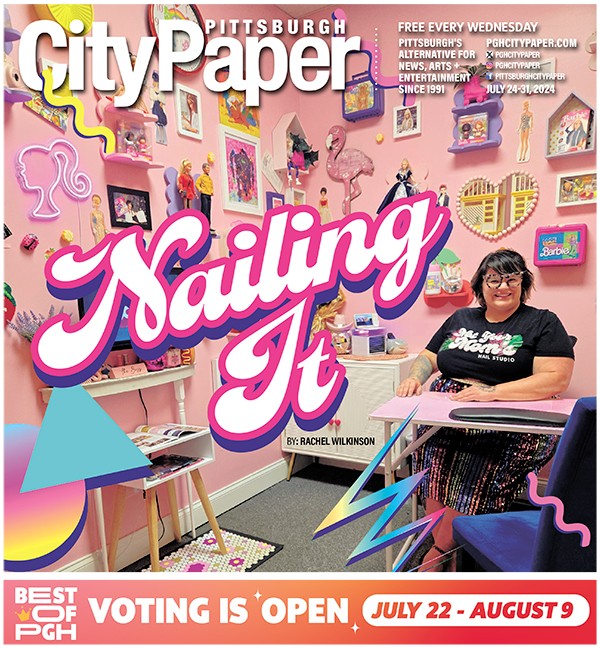1. Neither presidential candidate is addressing anything of real concern to black voters.
While there's too much symmetry among the presidential candidates, says local pollster and political statistician Carlos Brossard, there are also clear differences that could have tremendous impact upon blacks in America.
The George W. Bush administration is creating a "deepening of black structural unemployment," says Brossard -- American jobs permanently erased for export overseas, where the workforce is cheaper. The current administration is also causing the involuntary militarization of black youth, he adds. Young blacks who get in trouble in school or get caught up in the criminal system wind up joining the military because there are no options left to secure their future. While the military has long disproportionately recruited poor, underemployed minorities, with the ongoing struggles in Iraq there's no place Bush would probably rather have them right now, Brossard believes.
The black elderly face their own disproportionate threat: the nation's healthcare system, with its rising Medicare premiums and drug costs. Bush's simple tax relief won't do enough to address that, Brossard says.
If for no other reason, black voters should be concerned with the upcoming election because the next president may seat up to four new Supreme Court justices. According to a survey of both candidates by the Joint Center for Political and Economic Studies, an international non-partisan think tank, Democratic presidential hopeful John Kerry would appoint more mainstream judges, while Bush said he would appoint those who resemble the more controversially conservative Antonin Scalia and Clarence Thomas.
2. Presidential campaigns and supporters, especially Bush backers, are spending unprecedented amounts of money to grab "the Black Vote."
Advertising message from the Bush campaign and its supporters: "We care."
Both major political parties and the officially non-partisan groups who back them had been saying since the primaries that they would be spending unprecedented, historical amounts of money advertising with black media in order to lure the so-called black vote. This summer, eerie Kerry-bashing ads began running on the black-owned and operated WAMO FM and AM radio stations.
Credited to People of Color United, the ad castigated Kerry for being "rich, white and wishy-washy," then bashed his wife, Teresa Heinz Kerry, born in Mozambique, for declaring herself African American. The radio ad seemed to have a black voice but collided with black sensibilities, given that fewer than 16 percent of blacks nationwide give Bush a favorable approval rating. WAMO's market is 80- to 90-percent Democratic, reflecting black voting trends nationwide.
University of Pittsburgh grad student Vanessa Gerideau, former president of Pitt's Black Action Society, says she was "offended" by the ad: "It doesn't make sense, because the only other option is another rich, white politician, but one who doesn't have any of our interests in mind."
Because the ad makes no reference to Bush or any policy he's supported to help black communities, commentators and political experts in the black community contend it isn't meant to shift black votes to Republicans but to suppress black votes instead.
People of Color United, it turns out, though represented by a black conservative named Virginia Walden-Ford, was funded largely by J. Patrick Rooney, a rich, white Republican.
3. The Republican Party is the true party of blacks.
Some younger black voters are perhaps confused by the larger-than-ever showing of black delegates at the Republican National Convention. They see legendary African American Pittsburgh Steelers wide receiver Lynn Swann congratulating Bush at the convention, and notice future Hall of Fame running back Jerome Bettis donating $5,000 to Bush's campaign.
And then what's this talk about the Republican Party being the party of Frederick Douglass and Abraham Lincoln? Isn't he the prez who freed the slaves?
The majority of blacks surrendered to the GOP upon emancipation, but that lasted only until the Herbert Hoover administration. Ever since, as Rev. Al Sharpton pointed out at the Democratic National Convention, blacks have "decided we'd ride this donkey as far as it would take us." When Franklin D. Roosevelt took office with his New Deal package, blacks began their great migration to Democratic pastures and never looked back.
Often lost in that story is the campaign to switch parties, which was launched nationwide in Pittsburgh by former Republican statesman Robert L. Vann, founder and publisher of the Pittsburgh Courier -- then the most widely read black newspaper in the country. His famous line ("It is time that we Negroes turn Abraham Lincoln's picture to the wall") was the cue for blacks en masse to forget about the Republican Party, which was increasingly focusing its efforts on states' rights for the Jim Crow, lynch-heavy South.
4. Ex-felons can't vote.
An unlucky 13 states won't allow ex-felons to vote. Pennsylvania ain't one of those states.
While incarcerated felons can't vote, ex-cons' voting rights are restored immediately upon release -- for those registered to vote before imprisonment. According to the Allegheny County Department of Elections, all they've got to do is re-register once they get out of prison. It may still take some time for ex-prisoners to become first-time voters -- despite a 2000 lawsuit by ex-felons that lifted their voting ban.
Many of Pennsylvania's ex-felons still believe they're ineligible to vote, and conservative Republicans throughout the country have been fighting for policies that would make it that way nationally -- a state-by-state effort. GOP worries are understandable: 70 to 80 percent of ex-felons would vote Democratic, University of Minnesota sociologist Christopher Uggen told In These Times magazine.
5. The popular vote doesn't count.
Well, after the Florida 2000 vote debacle, perhaps that myth has some reality.
But as flawed as the Electoral College system may be, it is still governed by the popular vote. While thousands of black votes were unjustly invalidated in Florida, the bottom-line is "the popular vote creates the mandate or no mandate," says local political researcher Carlos Brossard. Flawed polls, he believes, have convinced the public that the core of super-conservatives who always vote Republican are larger than they actually are: "The more you let ... a low turnout look like a mandate, the more you give the impression that a fragile base has more strength than what they really have ...."
In the end, says Brossard, he has no patience for cynics and those who trivialize voting. "Instead of saying it doesn't matter," he says, "make it matter. Do something pro-active to make it work."














